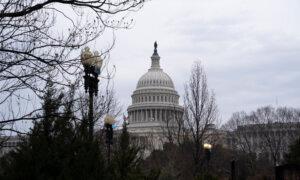The program, which provides funds to residents of areas contaminated by fallout and to workers mining radioactive materials, is set to expire on June 10.
Lawmakers are calling for House Speaker Mike Johnson (D-La.) to bring legislation to the floor that would renew and expand a compensation program for victims of radiation poisoning caused by atomic weapons testing.
The Radiation Exposure Compensation Act (RECA) was passed initially in 1990 to provide funds for residents of areas contaminated by fallout from atomic bomb tests from 1945 to 1962, or workers mining radioactive materials for the production of atomic weapons. It was extended in 2022 but is set to expire again on June 10.
RECA provides up to $75,000 compensation for residents affected in the immediate nuclear testing area, and up to $50,000 for “downwinders”—those living downwind of the test sites.
RECA coverage also extends to the 11 states where uranium was mined, reaching all the way to Washington State and North Dakota. Former uranium mining workers are eligible for a heftier benefit: up to $100,000 in compensation.
Rep. Cori Bush (D-Mo.), who is seeking to have the benefits extended to her constituency, highlighted the bipartisan support. A bill sponsored by Josh Hawley (R-Mo.) already passed the Senate with 69 votes in March.
“When you have Cori Bush and Josh Hawley on the same side fighting for the same thing for our Missourians, you need to listen,” Ms. Bush said.
The congresswoman was joined by Reps. Teresa Leger Fernandez (D-N.M.), Melanie Stansbury (D-N.M.), and Sen. Ben-Ray Lujan (D-N.M.) and others outside the Capitol in a May 16 press conference that included survivors and residents of the contaminated areas.
The expansion would cover the entire states of Colorado, Idaho, Montana, Arizona, Nevada, New Mexico, and Guam. Regions of states such as Missouri and Alaska also would be covered. It also extends the timeframe for uranium workers to 1990 and expands the list of eligible diseases.
Ms. Stansbury represents New Mexico’s District 1, the location of the Trinity site, where the initial atom bomb tests were held for the Manhattan Project. She related that those present for the initial tests were not informed of the danger, even as they were being evacuated in trucks while fallout rained down.
Asked why the bill had not yet been brought to the House for a vote, she said, “My guess is that it costs money, and right now there is a lot of division within the House GOP over new spending.
“And this program does cost money because it’s about providing healthcare and compensation for people who were harmed by U.S. activities.”
Health Concerns Years Later
At the hearing, residents affected by the radiation said they were unable to receive compensation because they lived just outside the eligible regions, or had worked during years not covered by the original Act.
John Greenwood was born and raised in Alamogordo, New Mexico, just 63 miles from the Trinity test site. Thirteen members of his family succumbed to cancer.
Beginning in 2008, he was stricken with three different cancers over four years. After beating colon and then kidney cancer, he was cancer-free for six months. Then he was diagnosed with stage four liver cancer that would eventually claim his life.
His wife, Laura Greenwood, said that although they had some insurance, it covered only 80 percent of his treatment. The rapid succession of illnesses sapped their funds, leading to total financial collapse.
John did not qualify for compensation as he did not live in the affected area during the eligible time frame.
“It literally broke us,” she said, relating that their utilities and phone service were disconnected multiple times, and their car repossessed.
“If we had had access to the RECA bills … we could have focused on my husband and the time we had left instead of worrying about how to get the power back on,” she said.
Original News Source Link – Epoch Times
Running For Office? Conservative Campaign Consulting – Election Day Strategies!


